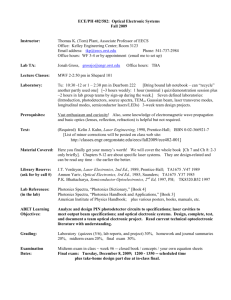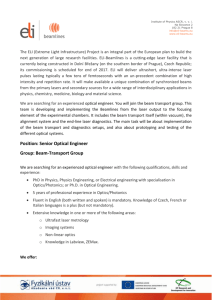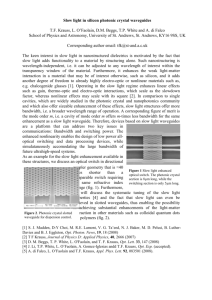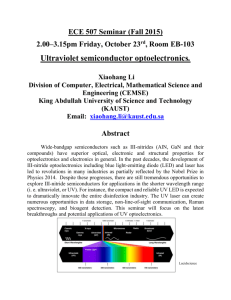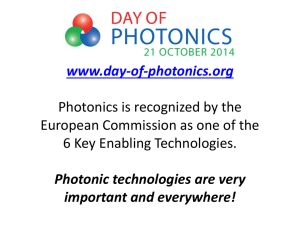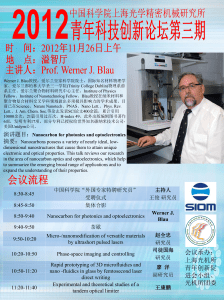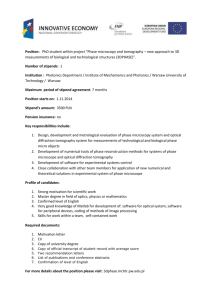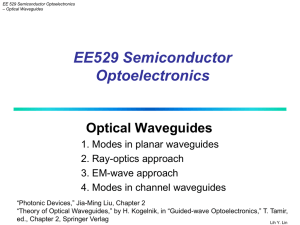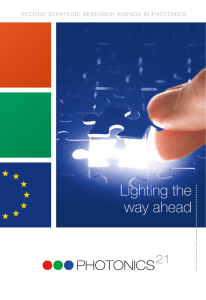Photonics
advertisement
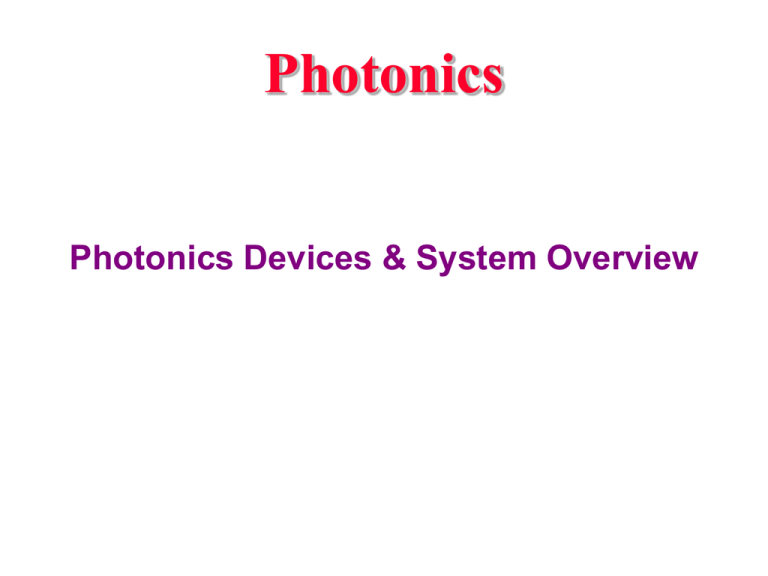
Photonics Photonics Devices & System Overview What is Optoelectronics /Photonics Is there any Difference ? Optoelectronics: Any device that operates as an electrical-tooptical or optical-to-electrical transducer. Photonics: "Photonics" comes from "photon" which is the smallest unit of light just as an electron is the smallest unit of electricity. "Photonics is the generation, process and manipulation of photon to achieve a certain function. Why Do We Need Photonics instead of Electronics? An “All - Pervasive” Technology 1) Uninhibited light travels thousands of times faster than electrons in computer chips. Optical computers will compute thousand of times faster than any electronic computer can ever achieve due to the physical limitation differences between light and electricity. 2) Can packed more wavelengths (that is information channels) into a optical fibre so that the transmission bandwidth is increased than conventional copper wires. 3) Light encounters no electromagnetic interference than that of electron in copper wires. What is a photonic transistor? • A transistor is a switch that is turned on and off by signals from other switches. They perform logic, store information and are the work horses of digital computing. Photonic transistors use light to perform the switching functions that are performed by electronic transistors in conventional computers. OPTOELECTRONICS application Displays. Display: alarm clock, TV and video recorder, microwave cooker and some ovens. Liquid crystal displays watches, calculators, telephones, portable radios, tape and CD players office machines such as faxes and copiers. Most laptop computers & Large flat screen TVs have liquid crystal displays. Continue Communications. A phone call outside local area To link computers, outside broadcast TV cameras, Banks, Stock Exchange dealing rooms, etc. Cameras. Camcorders and Digital still cameras depend on a high quality multi- component optical lens. Entertainment. TV remote controller sends a coded infra-red beam to the set. CD player uses a laser diode Continue Manufacturing. Lasers are being used for cutting and welding . Clothes made in large quantity are cut to shape using a laser. The gears in car have probably been welded to the shaft using a laser. The symbols all over the dashboard have been produced using a different type of laser to remove the black overcoat from a colored. CAREERS INVOLVING OPTOELECTRONICS • Optoelectronics Engineer . • Biological Researcher and Technician – uses microscopes with video camera attachment . • Civil Engineer – uses a laser beam with a theodelite to create a straight line over long distances to measure the angle of a proposed road bridge from a reference position. • Auto focus camera lens designer – uses computer programs to design the lens, the sensors and electronics to measure the sharpness of the image to control the focus, and CAD (Computer Aided Design) to design the components and housings. • Heating Engineer – uses a Thermal Imaging camera to give a high quality picture showing the temperature distribution across a scene. • Communications System Installer – couples optical fibers to electronic systems to route the information between computers, monitors etc. or to control a production machine. Continue • Conservation Specialist – uses laser beams to blast away the grime that has built up on buildings and statues • Environmental Inspector – uses a laser beam projected into the smoke plume from a factory to monitor the levels of the different gases emitted . • Quality Control Inspector – uses apparatus which measures the precise color spectrum of the food product . • Surgeon – uses a slip-on device over the patients thumb which monitors an infra-red beam to continuously measure the pulse rate. Also inserts a fiber optic endoscope into the patient with a camera attached. • Skilled Machinist – uses various types of laser beam under computer control e.g. to cut holes finer than a human hair, treat or decorate the metal surface, join components together in a vacuum Technology - SCOPE Light wave communications Consumer Photonics Pervasive computing Optoelectronics Devices & System Overview From System Perspective System Structure Optoelectronic Communication System Structure Optoelectronic Components Typical Optoelectronic Components Optoelectronics in Optical Communication System • Next figure “Network Example” shows characteristics of Long-Haul Networks and how these are tied into the multiple regional backbone providers for residential, cellular, and corporate networks. Continue Network Example Substrate Material: Waveguide Assembly processes are being evaluated to couple the signal from the waveguide to an active optical component. The key issues are component-to-waveguide assembly methods, equipment to minimize interfacial optical signal loss, alignment variations, and long-term stability. Waveguides in PWB Technology Example of Waveguides in PWB Technology
